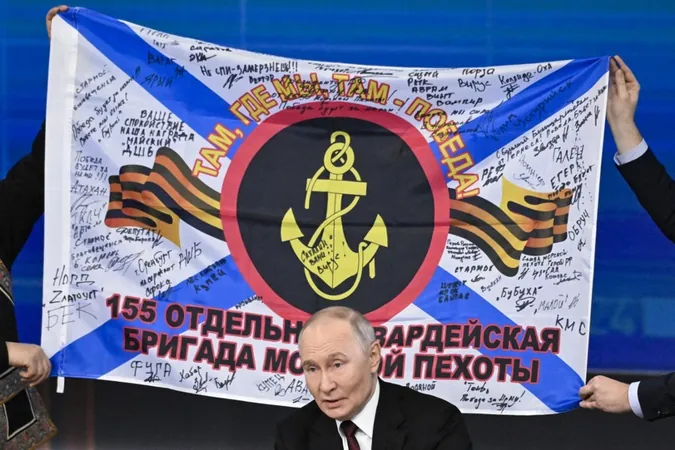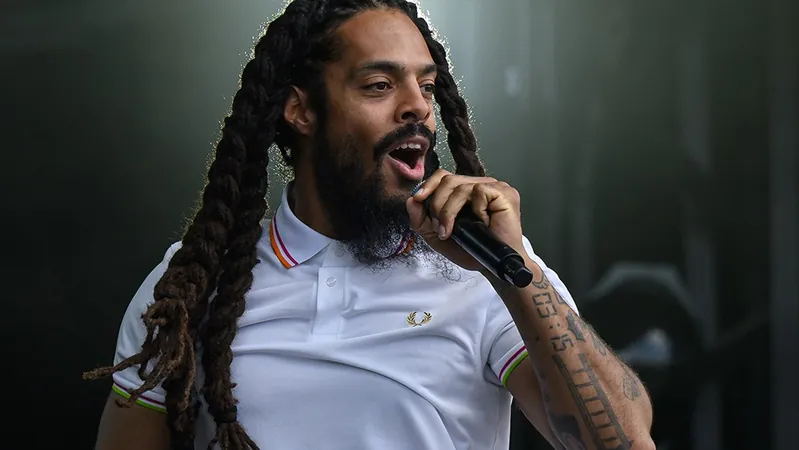
Putin's Persistent Push for Compromise: But At What Cost for Ukraine?
2024-12-19
Author: Lok
Introduction
In a striking reaffirmation of Russia's position, President Vladimir Putin has once again asserted Moscow's willingness to engage in negotiations regarding the ongoing conflict in Ukraine. However, he did not mince words while blaming Kyiv for allegedly shunning dialogue, casting doubt on any prospects for peace.
Putin's Stance on Negotiations
During his much-anticipated end-of-year news conference on December 19, Putin asserted, “Politics is the art of compromise. We have always said that we are ready for negotiations and compromise.” This annual session, which often resembles a carefully orchestrated public relations event, provides Putin with a platform to address contentious issues directly, despite the tightly controlled nature of the dialogue.
Critique of Ukraine's Position
In response to inquiries about the protracted war and its resolution, Putin criticized Ukrainian authorities for their refusal to engage in discussions. He remarked, 'The opposing side rejected these negotiations. Compromises are always the result of dialogue,' alluding to earlier dialogues that failed to yield constructive outcomes, notably the talks held in Istanbul in 2022.
Conditional Offers from Russia
Back in October, the Russian leader had indicated that Russia remains open to 'reasonable compromise.' However, he made it abundantly clear that he rejects any notion of concessions or compromises that do not favor Russia. 'The outcome of the war must reflect battlefield realities,' he insisted, as he declared that there are currently no conditions laid down for negotiations with Kyiv.
Specific Demands for Peace Talks
This year, Putin articulated specific demands that Ukraine must fulfill for peace talks to occur: the withdrawal of Ukrainian forces from contested regions such as Donetsk, Luhansk, Kherson, and Zaporizhzhia, a formal renunciation of Ukraine's aspirations to join NATO, and an end to Western sanctions against Russia. In contrast, Ukraine has firmly dismissed any possibility of compromise over territories under Russian occupation, deeming negotiations futile due to 'fundamentally irreconcilable' positions from both sides.
The Collapse of Initial Talks
Reflecting on the Istanbul talks that followed the onset of Russia's full-scale invasion, it’s evident that initial discussions presented a glimmer of hope. Ukrainian negotiators offered to adopt a neutral status in exchange for specific security guarantees, yet talks collapsed shortly after Russian troops pulled back from Kyiv in April 2022, revealing widespread atrocities. Putin later stated that negotiations had reached a 'dead end.'
Insights from Ukrainian Negotiators
David Arahamiya, head of Ukraine’s 'Servant of the People' party and a key negotiator during those early talks, corroborated that Russia's proposal included Ukraine abandoning its NATO ambitions for the promise of peace. However, Ukraine firmly rejected this plan due to constitutional barriers, given NATO membership was a key objective for the country. Arahamiya emphasized the pervasive mistrust towards Russia, highlighting the urgent necessity for enforceable security guarantees to ensure Ukraine's safety.
Conclusion
As the world watches, the question remains: can any genuine dialogue emerge in a landscape riddled with deep-seated grievances and starkly polarized interests? Will resilient Ukraine stand firm against Kremlin demands, or could the relentless push for compromise lead to unforeseen concessions with lasting repercussions? The unfolding situation is a compelling narrative of resilience and negotiation, a drama that continues to capture global attention.



 Brasil (PT)
Brasil (PT)
 Canada (EN)
Canada (EN)
 Chile (ES)
Chile (ES)
 Česko (CS)
Česko (CS)
 대한민국 (KO)
대한민국 (KO)
 España (ES)
España (ES)
 France (FR)
France (FR)
 Hong Kong (EN)
Hong Kong (EN)
 Italia (IT)
Italia (IT)
 日本 (JA)
日本 (JA)
 Magyarország (HU)
Magyarország (HU)
 Norge (NO)
Norge (NO)
 Polska (PL)
Polska (PL)
 Schweiz (DE)
Schweiz (DE)
 Singapore (EN)
Singapore (EN)
 Sverige (SV)
Sverige (SV)
 Suomi (FI)
Suomi (FI)
 Türkiye (TR)
Türkiye (TR)
 الإمارات العربية المتحدة (AR)
الإمارات العربية المتحدة (AR)